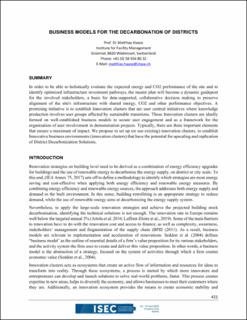Please use this identifier to cite or link to this item:
https://doi.org/10.21256/zhaw-27483| Publication type: | Conference paper |
| Type of review: | Peer review (publication) |
| Title: | Business models for the decarbonation of districts |
| Authors: | Haase, Matthias Konstantinou, Thaleia |
| et. al: | No |
| DOI: | 10.32638/isec2022 10.21256/zhaw-27483 |
| Proceedings: | ISEC 2022 Conference Proceedings |
| Page(s): | 421 |
| Pages to: | 424 |
| Conference details: | 2nd International Sustainable Energy Conference (ISEC), Graz, Austria, 5-7 April 2022 |
| Issue Date: | 4-Apr-2022 |
| Publisher / Ed. Institution: | AEE INTEC |
| Publisher / Ed. Institution: | Graz |
| Language: | English |
| Subject (DDC): | 333.79: Energy 658.2: Facility Management |
| Abstract: | In order to be able to holistically evaluate the expected energy and CO2 performance of the site and to identify optimized infrastructure investment pathways, the master plan will become a dynamic guidepost for the involved stakeholders, a basis for data-supported, collaborative decision making to preserve alignment of the site's infrastructure with shared energy, CO2 and other performance objectives. A promising initiative is to establish Innovation clusters that are user centred initiatives where knowledge production involves user groups affected by sustainable transitions. Those Innovation clusters are ideally formed on well-established business models to secure user engagement and as a framework for the organisation of user involvement in demonstration projects. Typically, there are three important elements that ensure a maximum of impact. We propose to set up (or use existing) innovation clusters, to establish Innovative business environments (innovation clusters) that have the potential for upscaling and replication of District Decarbonization Solutions. |
| URI: | https://digitalcollection.zhaw.ch/handle/11475/27483 |
| Fulltext version: | Published version |
| License (according to publishing contract): | Licence according to publishing contract |
| Departement: | Life Sciences and Facility Management |
| Organisational Unit: | Institute of Facility Management (IFM) |
| Published as part of the ZHAW project: | Dekarbonisierung von Quartieren |
| Appears in collections: | Publikationen Life Sciences und Facility Management |
Files in This Item:
| File | Description | Size | Format | |
|---|---|---|---|---|
| 2022_Haase_Business-models-for-the-decarbonation-of-districts_ISEC2022.pdf | 283.5 kB | Adobe PDF |  View/Open |
Show full item record
Haase, M., & Konstantinou, T. (2022). Business models for the decarbonation of districts [Conference paper]. ISEC 2022 Conference Proceedings, 421–424. https://doi.org/10.32638/isec2022
Haase, M. and Konstantinou, T. (2022) ‘Business models for the decarbonation of districts’, in ISEC 2022 Conference Proceedings. Graz: AEE INTEC, pp. 421–424. Available at: https://doi.org/10.32638/isec2022.
M. Haase and T. Konstantinou, “Business models for the decarbonation of districts,” in ISEC 2022 Conference Proceedings, Apr. 2022, pp. 421–424. doi: 10.32638/isec2022.
HAASE, Matthias und Thaleia KONSTANTINOU, 2022. Business models for the decarbonation of districts. In: ISEC 2022 Conference Proceedings. Conference paper. Graz: AEE INTEC. 4 April 2022. S. 421–424
Haase, Matthias, and Thaleia Konstantinou. 2022. “Business Models for the Decarbonation of Districts.” Conference paper. In ISEC 2022 Conference Proceedings, 421–24. Graz: AEE INTEC. https://doi.org/10.32638/isec2022.
Haase, Matthias, and Thaleia Konstantinou. “Business Models for the Decarbonation of Districts.” ISEC 2022 Conference Proceedings, AEE INTEC, 2022, pp. 421–24, https://doi.org/10.32638/isec2022.
Items in DSpace are protected by copyright, with all rights reserved, unless otherwise indicated.